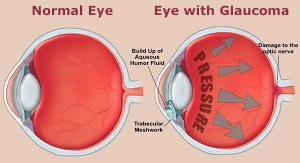Contact Us




Glaucoma is a group of eye diseases that can cause blindness. It is an eye infection that is frequently connected with raised intraocular pressure, in which harm to the eye (optic) nerve can cause visual impairment and even lead to loss of vision.
Glaucoma is the second leading cause of blindness in the world, accounting for up to 8% of the population. In India, Glaucoma is the main source of irreversible blindness, with at least 12 million individuals influenced and 1.2 million individuals blind from the ailment. More than 90 percent of cases of Glaucoma stay undiagnosed in the group.
Increased pressure, called Intraocular pressure in the eye is the main factor leading to Glaucoma. Less common causes include, blocked blood vessels inside the eye, eye infections, chemical injury to your eye and inflammatory infections. It mostly affects both the eyes, however it might be worse in one than the other.
Symptoms of Open angle Glaucoma are loss of peripheral vision, and that can go unnoticed until late in the disease,that is the reason glaucoma is regularly called the “sneak thief of vision.” Another symptom is that in advanced stage the patient has tunnel vision.
Symptoms of Close angle Glaucoma are appearance of halos around lights, blurred vision, eye pain, nausea or vomiting and redness in the eye.
Anxiety and depressive symptoms are two common, normal responses to a Glaucoma diagnosis. Researchers have found that anxiety is greatly related with Glaucoma, according to a study in the American Journal of Ophthalmology. The researchers also noted that Glaucoma medication, such as topical -blockers and carbonic anhydrase inhibitors, can cause anxiety and depression is a known side effect of oral corticosteroids.
Glaucoma may influence your loved one’s quality of life in many ways, through mental impact of diagnosis (like anxiety, fear of visual impairment, fear of consequences for other relatives and depression), visual impact of glaucoma (eg, diminished side vision ), the potential side effects of treatment (medicinal or surgical), and the financial impact (like cost of visits and treatment, loss of pay as a result of non-appearance from work).
According to the National Eye Institute statistics, people above the age of 65 are at a risk of developing depression and anxiety due to the vision loss. The opthamologist can play a key role here in ensuring that in addition to helping the patient understand about the treatment, they are also able to ensure the emotional well being of the eldelry.
1. Early engagement with people suffering from Glaucoma: Every loved one diagnosed with Glaucoma should be encourage to take care of their eye health. If Glaucoma is detected in the early stage then the treatment is more likely to succeed, which will decrease the chance of anxiety and depression in loved one’s.
2. Cooperate with mental health services: Cognitive Behavioral Therapy or Drug therapy can be useful for reducing or eliminating negative thoughts and have a good quality of life for the loved one with Glaucoma. People who get diagnosed with Glaucoma often rely on their doctors for the clarity of their future, and when this does not happen they tend to develop depression and anxiety.
If you have an aging parent who has glaucoma, you might be prepared to venture into another part as a parental figure. Glaucoma can display many difficulties as the disease advances, for example, constrained side vision and trouble seeing in low light.
There is no cure for Glaucoma, however you have an exceptional capacity as a guardian to help save your loved one’s vision and delay vision loss. By following some of the simple steps stated above, you can essentially affect your loved one’s eye health.
We at Samvedna Care aim to help seniors live happy, active and independent lives, in the comfort of their home and community through interactive caregiving.
Samvedna Care was established in October 2013 with two complementary goals – firstly to provide quality home care services to seniors with limited mobility or dementia and hence social interaction, and secondly to facilitate stimulating community interaction and participation. All our senior care specialists are psychologists or gerontologists.
With our General Well Being
Services we aim to raise the quality of life of seniors, specially those who may have limited mobility and social interaction due to various constraints. Our interactive programme keeps them active and engaged through physical, mental and social activities, all in the comfort of their home.
Great Times Club, which is a part of the Samvedna Care Foundation, is our social and recreational club in Sector 57, Gurgaon, for members 55 years and above.Its a place where members come to get fit, meet like minded people and share their life experiences and give back to the community.
Activities at the club include fitness exercises, group meditation, mind stimulation, tambola, dancing, book reviews, movies, community outreach, and talks on health management. The club has a library, computer room, visits by physiotherapists and doctors, access to board games and cards, a fully functional pantry with healthy and affordable snacks and tea and coffee on the house.
There are special discounts for group memberships. The club is open Monday-Friday, 11am to 2pm.There are special classes for yoga, smart phones, computers, spoken english, dance, music and painting. We also have Bridge mornings every Tuesday and Thursday. Call Great Times Club at 9818421446, 0124-4229659.
Know more here – Great Times Club